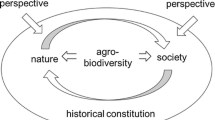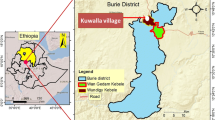Abstract
This paper reflects on the impacts of agrarian change and social reorganisation on gender-nature relations through the lens of an indigenous group named the Kuruma in South India. Building upon recent work of feminist political ecology, I uncover a number of dualisms attached to the gender-nature nexus and put forward that gender roles are constituted by social relations which need to be analysed with regard to the transformative potential of gender-nature relations. Three main themes are at the centre of the empirical inquiry: gender subjectivities, rural off-farm employment and the human-nature nexus. I seek to show that, first, the production of gendered subjectivities cannot be simplified through essentialist assumptions that romanticise women’s relationships with nature; second, off-farm employment strategies both reinforce the social hierarchy in gender and contradict the Kuruma’s moral economies; and, finally, environmental and agrarian change redefine the use of agrobiodiversity and are related to ideas on progressive versus nonprogressive cultivation practices. The research is informed by qualitative research methods and offers a conceptual approach to the deconstruction of gender-nature relations from a poststructuralist feminist perspective.
Similar content being viewed by others
Notes
Muenster’s (2012) ethnographic study on the political ecology of farmer suicides in the agrarian district of Wayanad reveals that they are linked to two trends: firstly, to specific practices of cash crop farming and to the regional history of the political–ecological crisis and, secondly, to biographies of migration, personal aspirations, choking debts, problematic family relations and possibly to diseases and alcoholism.
My fieldwork from 2010 to 2012 has revealed that is usually Kuruma men who own and inherit agricultural land. Once a woman is married, she usually uses her husband’s fields for cultivation. Meanwhile, unmarried women work on the fields of their parents or extended family members.
References
Agarwal, B. 1992. The gender and environment debate: Lessons from India. Feminist Studies 18(1): 119–159.
Anil Kumar, N.P., G. Gopi, and P. Prajeesh. 2010. Genetic erosion and degradation of ecosystem services in wetland rice fields: A case study from Western Ghats, India. In Agriculture, biodiversity and markets: Livelihoods and agroecology in comparative perspective, ed. S. Lockie, and D. Carpenter, 137–153. London: Earthscan.
Arun, S. 2012. ‘We are Farmers too’: Agrarian change and gendered livelihoods in Kerala, South India. Journal of Gender Studies 21(3): 271–284.
Bauriedl, S. 2010. Erkenntnisse der Geschlechterforschung für eine erweiterte sozialwissenschaftliche Klimaforschung. In Geschlechterverhältnisse, Raumstrukturen, Ortsbeziehungen: Erkundungen von Vielfalt und Differenz im spatial turn, ed. S. Bauriedl, M. Schier, and A. Strüver, 194–216. Münster: Westfälisches Dampfboot.
Betz, L., I. Kunze, P. Prajeesh, T.R. Suma, and M. Padmanabhan. 2014. The social–ecological web: A bridging concept for transdisciplinary research. Current Science 10(4): 572–579.
Bhavnani, K.-K., J. Foran, P.A. Kurian, and D. Munshi (eds.). 2003. Feminist futures: Reimagining women, culture and development. London: Zed Books.
Brocheux, P. 1983. Moral economy or political economy? The peasants are always rational. The Journal of Asian Studies 42(4): 791–803.
Brodt, S.B. 1999. Interactions of formal and informal knowledge systems in village-based tree management in central India. Agriculture and Human Values 16(4): 355–363.
Bryman, A. 2008. Social research methods, 3rd ed. Oxford: Oxford University Press.
Chakrapani, C., and S. Vijaya Kumar (eds.). 1994. Changing status and role of women in Indian society. New Delhi: MD Publications.
Crang, M. 2003. Qualitative methods: Touchy, feely, look-see? Progress in Human Geography 27(4): 494–504.
Devika, J., and B.V. Thampi. 2007. Between ‘Empowerment’ and ‘Liberation’: The Kudumbashree initiative in Kerala. Indian Journal of Gender Studies 14(1): 33–60.
Dhas, A. C. 2009. Agricultural crisis in India: The root cause and consequences. http://mpra.ub.uni-muenchen.de/18930/. Accessed 8 March 2015.
Elmhirst, R., and B. Resurreccion (eds.). 2008. Gender and natural resource management. London: Earthscan.
Elmhirst, R. 2011. Introducing new feminist political ecologies. Geoforum 42(2): 129–132.
Elmhirst, R. 2015. Feminist political ecology. In The Routledge handbook of gender and development, eds. A. Coles, L. Gray and J. Momsen, 58–66. Routledge handbooks. London: Routledge.
Evers, H.-D., and H. Schrader. 1994. The moral economy of trade: Ethnicity and developing markets. London: Routledge.
Finnis, E. 2007. The political ecology of dietary transitions: Changing production and consumption patterns in the Kolli Hills, India. Agriculture and Human Values 24(3): 343–353.
Government of India. 2013. The Mahatma Gandhi National Rural Employment Guarantee Act 2005. http://nrega.nic.in. Accessed 8 March 2015.
Gururani, S. 2002. Construction of third world women’s knowledge in the development discourse. International Social Sciences Journal 54(173): 313–323.
Haque, T. 2011. Socio-economic impact of implementation of Mahatma Gandhi National Rural Employment Guarantee Act in India. Social Change 41(3): 445–471. doi:10.1177/004908571104100307.
Jarosz, L. 2000. Understanding agri-food networks as social relations. Agriculture and Human Values 17(3): 279–283.
Jewitt, S. 2000. Unequal knowledges in Jharkhand, India: De-romanticizing women’s agroecological expertise. Development and Change 31(5): 961–985.
Jose, M., and M. Padmanabhan. 2015. Dynamics of agricultural land use change in Kerala: A policy and social-ecological perspective. International Journal of Agricultural Sustainability 14(3): 307–324.
Kelkar, M. 2007. Local knowledge and natural resource management: A gender perspective. Indian Journal of Gender Studies 14(2): 295–306.
Krishna, S. (ed.). 1998. Gender and biodiversity management. Gender dimensions in biodiversity management. Delhi: Konark.
Krishna, S. 2007. feminist perspectives and the struggle to transform the disciplines: Report of the IAWS Southern Regional Workshop. Indian Journal of Gender Studies 14(3): 499–514.
Kunze, I., and J. Momsen. 2015. Exploring gendered rural spaces of agrobiodiversity management—A case study from Kerala, India. In The Routledge handbook of gender and development, eds. A. Coles, L. Gray and J. Momsen, 106–116. Routledge handbooks. London: Routledge.
Lerche, J. 2011. Agrarian crisis and agrarian questions in India. Review essay. Journal of Agrarian Change 11(1): 104–118.
Mies, M., and V. Shiva. 1998. Ecofeminism. Melbourne: Spinifex Press.
Momsen, J. 2009. Gender and development. London: Routledge.
Moss, P. (ed.). 2002. Feminist geography in practice: Research and methods. Malden: Blackwell Publishers Ltd.
MSSRF—The M. S. Swaminathan Research Foundation. 2003. Farmers’ rights and biodiversity: A gender and community perspective. Chennai: MSSRF.
Muenster, D. 2012. Farmers’ suicides and the state in India: Conceptual and ethnographic notes from Wayanad, Kerala. Contributions to Indian Sociology 46(1–2): 181–208.
Nagabhatla, N., and N.P. Anil Kumar. 2013. Developing a joint understanding of agrobiodiversity and land-use change. In Cultivate diversity! A handbook on transdisciplinary approaches to agrobiodiversity research, ed. A. Christinck, and M. Padmanabhan, 27–51. Weikersheim: Margraf Publishers.
Narasimha Reddy, D., and S. Mishra. 2009. Agrarian crisis in India. New Delhi: Oxford University Press.
Nightingale, A.J. 2012. The embodiment of nature: Fishing, emotion, and the politics of environmental values. In Human-environment relations: Transformative values in theory and practice, ed. E. Brady, and P. Phemister, 135–147. London: Springer.
Quisumbing, A.R., D. Rubin, C. Manfre, E. Waithanji, M. van den Bold, D. Olney, N. Johnson, and R. Meinzen-Dick. 2015. Gender, assets, and market-oriented agriculture: learning from high-value crop and livestock projects in Africa and Asia. Agriculture and Human Values 32(4): 705–725.
Pellissery, S., and S.K. Jalan. 2011. Towards transformative social protection: A gendered analysis of the employment guarantee act of India (MGNREGA). Gender & Development 19(2): 283–294.
Perkins, J.H. 1993. Cuba, Mexico, and India: Technical and social changes in agriculture during political economic crisis. Agriculture and Human Values 10(3): 75–90.
Plumwood, V. 1993. Feminism and the mastery of nature. London: Routledge.
Rath, G.C. (ed.). 2006. Tribal development in India: The contemporary debate. New Delhi: Sage.
Rocheleau, D., B. Thomas-Slayer, and E. Wangari (eds.). 1996. Feminist political ecology: Global issues and local experiences. London: Routledge.
Rometsch, J., and M. Padmanabhan. 2013. Vandana Shiva: Kämpferin für das, Gute Leben‘oder rückwärtsgewandte Konservative? Ariadne 64: 40–47.
Scott, J.C. 1976. The moral economy of the peasant: Rebellion and subsistence in Southeast Asia. New Haven: Yale University Press.
Seager, J. 1993. Earth follies: Feminism, politics and the environment. London: Earthscan.
Shiva, V. 1988. Staying alive: Women, ecology and survival in India. New Delhi: Kali for Women.
Thadathil, M.S., and V. Mohandas. 2012. Impact of MGNREGS on labour supply to agricultural sector of Wayanad District in Kerala. Agricultural Economics Research Review 25(1): 151–155.
Valdivia, C., and J. Gilles. 2001. Gender and resource management: Households and groups, strategies and transitions. Agriculture and Human Values 18(1): 5–9.
Williams, G., and E. Mawdsley. 2006. India’s evolving political ecologies. In Colonial and post-colonial geographies of India, ed. S. Raju, M. Satish Kumar, and S. Corbridge, 261–278. New Delhi: Sage.
Winchester, H.P.M. 2000. Qualitative research and its place in human geography. In Qualitative research methods in human geography, ed. I. Hay, 1–22. Melbourne: Oxford University Press.
Author information
Authors and Affiliations
Corresponding author
Rights and permissions
About this article
Cite this article
Kunze, I. Dualisms shaping human-nature relations: discovering the multiple meanings of social-ecological change in Wayanad. Agric Hum Values 34, 983–994 (2017). https://doi.org/10.1007/s10460-016-9760-x
Accepted:
Published:
Issue Date:
DOI: https://doi.org/10.1007/s10460-016-9760-x




